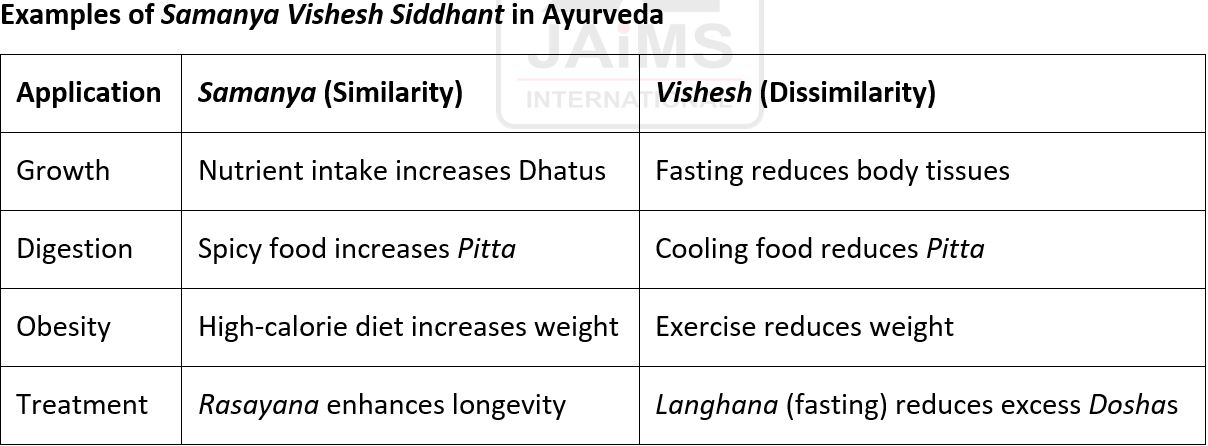Samanya Vishesh Siddhant: A Fundamental Principle of Ayurveda
DOI:
https://doi.org/10.21760/jaims.10.6.40Keywords:
Nyaya-Vaisheshika Philosophy, Vriddhi, Kshaya, Samanya, VisheshAbstract
Samanya Vishesh Siddhant is a fundamental principle of Ayurveda that explains the mechanisms of increase (Vriddhi) and decrease (Kshaya) in the body. Derived from the Nyaya-Vaisheshika philosophy, this concept plays a crucial role in understanding physiological balance, pathology, and treatment strategies. Samanya (similarity) is responsible for the augmentation of substances with similar attributes, while Vishesh (dissimilarity) leads to the reduction of qualities due to opposing characteristics.[1] This principle is applied in various domains of Ayurveda, including physiology (Sharira Kriya Vigyan), pathology (Roga Nidan), treatment (Chikitsa), dietetics (Ahara Vidhi), and pharmacology (Dravya Guna Vigyan). It helps in diagnosing diseases and formulating therapies based on the balance of Doshas, Dhatus, and Malas. For instance, nourishing therapies (Rasayana) utilize Samanya to promote tissue growth, while purification therapies (Shodhana) employ Vishesh to eliminate excess Doshas. In the modern context, Samanya Vishesh Siddhant is comparable to the concept of homeostasis in contemporary medicine. It provides a logical basis for managing lifestyle disorders such as obesity, diabetes, and hypertension through dietary and therapeutic interventions. Understanding and applying this principle allows for a holistic approach to health maintenance, disease prevention, and personalized treatment in Ayurveda.[2]
Downloads
References
Sharma RK, Das VB. Caraka Samhita of Agnivesa: Ayurved Dipika commentary by Cakrapani Dutta. Vol. 1. Varanasi: Chaukhambha Sanskrit Series Office; 2016. p. 225. (Ch. Su.1/28–29).
Agnivesa. Charaka Samhita: Ayurved Dipika commentary by Cakrapani Dutta. Edited by Acharya YT. Varanasi: Chaukhambha Surabharti Prakashan; 2014. p. 626. (Ch. Su.9/4).
Acharya YT. Caraka Samhita of Agnivesa: Ayurved Dipika commentary by Cakrapani Dutta. Varanasi: Chaukhambha Surbharti Prakashan; 2014. p. 111. (Ch. Su.19/5).
Acharya YT. Caraka Samhita of Agnivesa: Ayurved Dipika commentary by Cakrapani Dutta. Varanasi: Chaukhambha Surbharti Prakashan; 2014. (Ch. Su.1/59–61).
Moreswar KA. Astangahrdaya of Vagbhata: Sarvangasundara commentary by Arunadatta and Ayurvedarasayana by Hemadri. Varanasi: Chaukhambha Surbharti Prakashan; 2017. p. 26. (A.H.Su.2/8).
Shastri A, editor. Sushruta Samhita of Sushruta, Sutrasthan. Varanasi: Chaukhambha Orientalia; 2014. p. 84. (Ch. 15, V. 48).
Shastri S, editor. Madhukosha Sanskrit Commentary on Madhav Nidan of Madhav. Varanasi: Chaukhamba Sanskrit Sansthan; 1992. p. 170. (Amlapitta Nidan, V. 1).
PV, editor. Caraka Samhita (text with English translation), Sootra Sthan. Varanasi: Chaukhambha Orientalia; 2012. (Dirghanjivitiya: Ch.1, V. 44–45).















